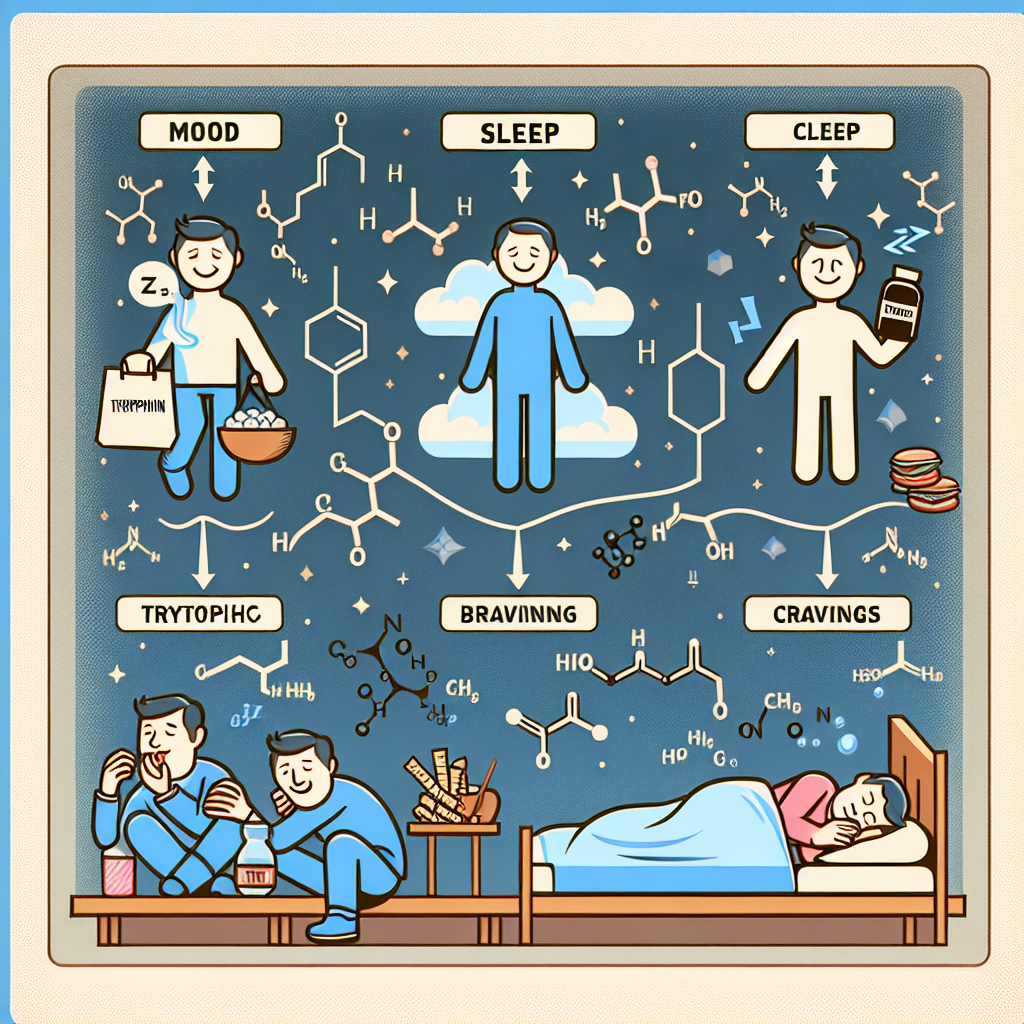The Role of Tryptophan in Mood, Sleep, and Cravings

Discover more about the crucial role of Tryptophan in regulating your mood, sleep, and cravings. Learn how this essential amino acid can help improve your overall health and well-being. Don’t wait, start your journey to a healthier lifestyle today. Click here to find out more.
Exploring the Impact of Tryptophan on Sleep Quality and Duration
Tryptophan, an essential amino acid, plays a crucial role in our overall health and well-being. It is a vital component in the production of serotonin, a neurotransmitter that regulates mood, sleep, and appetite. This article will delve into the impact of tryptophan on sleep quality and duration, and how it influences our cravings.
Tryptophan is found in various foods, including turkey, eggs, cheese, fish, and chocolate. When we consume these foods, our bodies convert tryptophan into 5-HTP (5-hydroxytryptophan), which is then transformed into serotonin. Serotonin is often referred to as the ‘feel good’ hormone because of its significant role in mood regulation. However, its influence extends beyond mood enhancement. It is also a precursor to melatonin, the hormone responsible for regulating our sleep-wake cycle.
The relationship between tryptophan and sleep is a fascinating one. Research has shown that tryptophan can enhance both sleep quality and duration. A study published in the Journal of Psychiatric Research found that participants who took a tryptophan supplement had improved sleep efficiency and increased total sleep time. This is likely due to the increased production of melatonin, which helps regulate our circadian rhythm and promotes restful sleep.
Moreover, tryptophan’s role in serotonin production also influences our sleep patterns. Low levels of serotonin are linked to insomnia and other sleep disorders. By increasing serotonin levels, tryptophan can help alleviate these issues and promote better sleep. It’s important to note, however, that while tryptophan can improve sleep, it’s not a cure-all solution. Other factors, such as stress, diet, and lifestyle, also play a significant role in sleep quality and duration.
In addition to its impact on sleep, tryptophan also plays a role in regulating our cravings. Serotonin is known to suppress appetite, and since tryptophan is a precursor to serotonin, it can help control cravings and promote feelings of satiety. This is particularly beneficial for those trying to maintain a healthy weight or manage conditions like obesity and diabetes.
However, the relationship between tryptophan and cravings is complex. While it can help suppress appetite, it can also lead to cravings for carbohydrates. This is because carbohydrates increase the amount of tryptophan that crosses the blood-brain barrier, leading to increased serotonin production. This can result in a temporary mood boost, which may lead to cravings for carbohydrate-rich foods.
In conclusion, tryptophan plays a significant role in regulating mood, sleep, and cravings. Its role in serotonin and melatonin production can enhance sleep quality and duration, while its influence on appetite can help control cravings. However, it’s important to remember that while tryptophan can contribute to these areas, it’s not a standalone solution. A balanced diet, regular exercise, and good sleep hygiene are also crucial for optimal health and well-being.
Understanding the Role of Tryptophan in Regulating Mood and Emotions

Tryptophan, an essential amino acid, plays a crucial role in regulating mood, sleep, and cravings. It is a vital component in the production of serotonin, a neurotransmitter that significantly influences our emotional state, sleep patterns, and appetite. Understanding the role of tryptophan in these areas can provide valuable insights into managing mental health and overall well-being.
Tryptophan is not naturally produced by the body and must be obtained through diet. Foods rich in tryptophan include turkey, eggs, cheese, nuts, and seeds. Once consumed, tryptophan is absorbed into the bloodstream and transported to the brain, where it is converted into serotonin. This neurotransmitter is often referred to as the ‘feel-good’ hormone due to its significant role in mood regulation.
Serotonin is responsible for maintaining a balanced emotional state. Low levels of serotonin are associated with mood disorders such as depression and anxiety. Therefore, a diet rich in tryptophan can potentially help in managing these conditions by boosting serotonin production. However, it’s important to note that while tryptophan can aid in serotonin production, it’s not a standalone treatment for mood disorders. Professional medical advice should always be sought for these conditions.
In addition to mood regulation, tryptophan also plays a significant role in sleep regulation. Serotonin, the by-product of tryptophan, is a precursor to melatonin, the hormone responsible for regulating the sleep-wake cycle. When darkness falls, the pineal gland in the brain converts serotonin into melatonin, signaling to the body that it’s time to sleep. Therefore, a diet rich in tryptophan can potentially improve sleep quality by increasing melatonin production.
However, the relationship between tryptophan and sleep is not as straightforward as it may seem. While tryptophan can aid in the production of melatonin, other factors such as light exposure and stress levels can also influence melatonin production. Therefore, while a diet rich in tryptophan can potentially improve sleep quality, it should be complemented with good sleep hygiene practices for optimal results.
Tryptophan also plays a role in regulating cravings, particularly for carbohydrates. Serotonin is known to suppress appetite, and since tryptophan is a precursor to serotonin, it can potentially help in managing cravings. However, the relationship between tryptophan and cravings is complex and influenced by various factors, including stress levels and hormonal balance. Therefore, while a diet rich in tryptophan can potentially help manage cravings, it should not be viewed as a standalone solution for weight management.
In conclusion, tryptophan plays a crucial role in regulating mood, sleep, and cravings through its role in serotonin production. A diet rich in tryptophan can potentially help manage mood disorders, improve sleep quality, and control cravings. However, it’s important to remember that while tryptophan can aid in these areas, it’s not a standalone solution. Professional medical advice should always be sought for mood disorders, and good sleep hygiene practices and a balanced lifestyle should be maintained for optimal sleep quality and weight management.
The Connection Between Tryptophan and Food Cravings: A Comprehensive Analysis
Tryptophan, an essential amino acid, plays a crucial role in our body’s physiological functions. It is a vital component in the production of serotonin, a neurotransmitter that regulates mood, sleep, and appetite. The connection between tryptophan and food cravings is a fascinating area of study, offering insights into the complex interplay between nutrition, brain chemistry, and behavior.
Tryptophan is found in various foods, including turkey, eggs, cheese, nuts, and seeds. When we consume these foods, our bodies convert tryptophan into serotonin. This neurotransmitter is often referred to as the ‘feel-good hormone’ because of its significant role in promoting feelings of well-being and happiness. It also helps regulate our sleep-wake cycle, contributing to a good night’s sleep.
However, the relationship between tryptophan and our dietary habits extends beyond its role in serotonin production. Research suggests that tryptophan may also influence our food cravings. Cravings are intense desires for specific foods, often high in fat, sugar, or salt. They are thought to be driven by a complex interplay of factors, including hormonal fluctuations, emotional states, and brain chemistry.
One theory posits that when our serotonin levels are low, we may experience increased cravings for carbohydrate-rich foods. This is because carbohydrates can boost the brain’s uptake of tryptophan, leading to increased serotonin production. In other words, our bodies may crave carbs as a way of self-regulating serotonin levels.
This theory is supported by several studies. For instance, research has shown that individuals who follow a low-tryptophan diet often report increased cravings for carbohydrates. Similarly, people with conditions associated with low serotonin levels, such as depression and premenstrual syndrome (PMS), often experience intense food cravings.
However, it’s important to note that the relationship between tryptophan, serotonin, and food cravings is complex and influenced by many factors. For example, stress and lack of sleep can also disrupt serotonin production and trigger cravings. Moreover, not all cravings are driven by low serotonin levels. Some cravings may be linked to other neurotransmitters, such as dopamine, which is associated with reward and pleasure.
Furthermore, while consuming carbohydrate-rich foods can boost serotonin levels in the short term, it’s not a sustainable solution for maintaining optimal serotonin levels. Regular consumption of such foods, especially those high in refined sugars, can lead to weight gain and other health problems. A balanced diet rich in foods containing tryptophan, along with regular exercise and good sleep hygiene, is a healthier and more effective strategy for maintaining optimal serotonin levels.
In conclusion, tryptophan plays a crucial role in regulating mood, sleep, and food cravings. While the connection between tryptophan and food cravings is complex and influenced by many factors, understanding this relationship can provide valuable insights into the physiological mechanisms underlying our dietary habits. It underscores the importance of a balanced diet, regular exercise, and good sleep hygiene in promoting mental well-being and healthy eating habits.